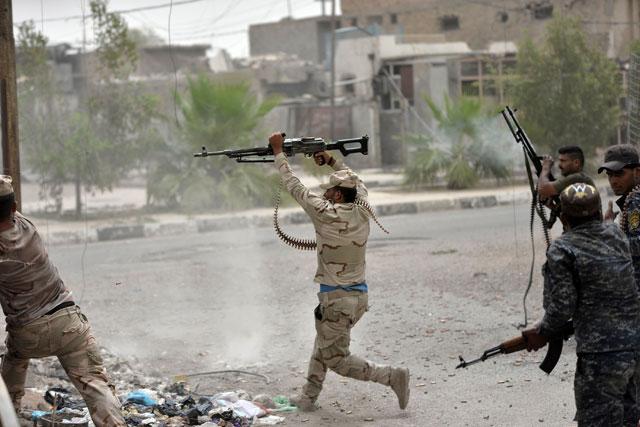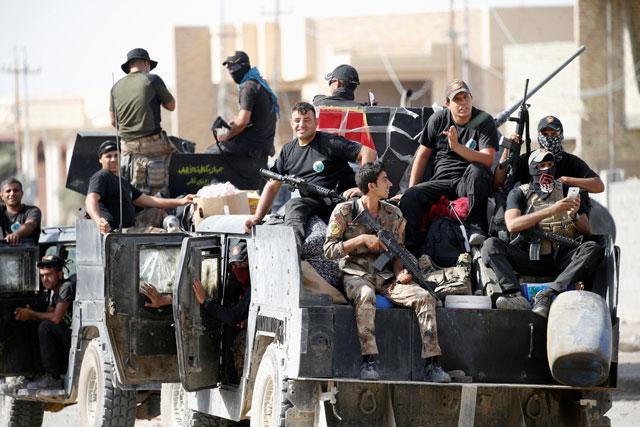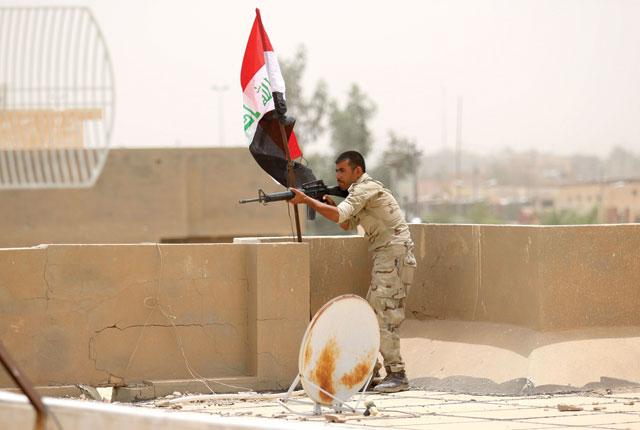You are here
Iraqi forces hunt Daesh in Fallujah and eye Mosul
By AFP - Jun 18,2016 - Last updated at Jun 18,2016

Iraqi government forces clash with Daesh militants in Fallujah on Saturday as they hunt down holdout terrorists after retaking the city (AFP photo )
FALLUJAH, Iraq — Iraqi forces hunted down holdout militants in Fallujah Saturday after retaking the city centre and trained their sights on Mosul, the Daesh terror group's last remaining major hub in the country.
While not fully under government control yet, Fallujah is the latest in a string of battlefield losses for Daesh, which has seen its two-year-old "caliphate" shrink significantly in recent months.
Prime Minister Haider Al Abadi on Friday declared Fallujah retaken after the national flag was raised over the main government compound, but Daesh militants still hold most northern neighbourhoods.
Elite Iraqi forces "are continuing their progress in the liberation of neighbourhoods in northern Fallujah", Lieutenant General Abdulwahab Al Saadi, overall commander of the operation, told AFP.
Forces led by the police of Anbar province, where Fallujah is located, were meanwhile combing reconquered southern neighbourhoods for pockets of Daesh militants and explosive devices, he said.
Abadi announced the recapture of the city of Ramadi, Anbar’s provincial capital, in December but the security forces only established full control over the city in February.
Over the past few days, Daesh has carried out several significant attacks in the Ramadi area, the latest on Saturday in a region called Zankura
Most vulnerable
Saadi and other commanders said Iraqi forces faced only limited resistance during the major advance that saw them push into the heart of Fallujah and secure a breakthrough in the four-week-old operation.
Security sources said Daesh members have been slipping out of the city by blending in with civilians fleeing the fighting.
Daesh’s retreat in Fallujah sparked what the Norwegian Refugee Council described as “an unprecedented tidal wave of mass displacement from Fallujah”.
It said late Friday that up to 20,000 people fled the city in just a few hours.
Footage on social media showed hundreds of people swimming across the Euphrates to reach safety.
“It is unknown how many families are still trapped inside Fallujah but we are concerned they are the most vulnerable — pregnant women, elderly people, people with disabilities,” the NRC said.
Aid groups have been warning for days they would be overwhelmed by the flow of displaced and were running low on funding and supplies to respond to the humanitarian crisis.
Building on the momentum of the Fallujah operation, Iraq announced on Saturday that joint Kurdish-federal forces were starting a new phase in the push on Mosul from the south.
“We started at 5:00am (0200 GMT) the second phase of the liberation of Nineveh,” Defence Minister Khaled Al Obeidi told AFP.
“The target of the operation is to take Qayyarah and make it a launchpad for Mosul,” Obeidi said.
Mosul next
Qayyarah, which has an airfield, lies across the River Tigris from the main base for pro-governmental forces in the Kurdish-controlled area of Makhmur.
It is some 60km south of Mosul.
Forces working their way up from the south along the Tigris also revived a stalled offensive on Saturday, security officials in the Salaheddin province said.
Abadi ignored US advice to focus on Mosul last month when he declared the launch of the Fallujah operation, but he vowed on Friday that the liberation of the northern city was “very near”.
The embattled premier has promised that Daesh would be defeated nationwide by the end of 2016, but an ongoing offensive in Nineveh province, of which Mosul is the capital, has achieved only modest gains so far.
Fallujah, where US forces suffered some of their worst losses since the Vietnam war, looms large in modern extremist mythology but Mosul is much larger.
Analysts argued that Daesh could survive the sequence of military losses a bit longer but that their self-proclaimed caliphate was already looking moribund.
“The ISIS [Daesh] messaging machine will likely find ways to continue attracting recruits and encouraging lone-wolf attacks despite the loss of Fallujah,” Patrick Martin, Iraq analyst with the Institute for the Study of War, said.
The extremist group, which has recorded few military successes on home turf lately and grabbed more headlines for claiming attacks in the West, now faces major offensives ultimately aimed at its Syria de facto capital Raqqa and at Mosul.
“Mosul and Raqqa could be very different battles since when they fall the delusions of holding a caliphate completely fall away,” said Patrick Skinner, an analyst with the Soufan Group.
Related Articles
FALLUJAH, Iraq — Iraqi forces took the Daesh terror group’s last position in the city of Fallujah Sunday, establishing full control over one
FALLUJAH — Aid workers scrambled Sunday to cope with a massive influx of Iraqi civilians who fled Fallujah after government forces retook mu
FALLUJAH, Iraq — Iraqi forces closed in on the last neighbourhood of Fallujah still held by the Daesh terror group Thursday while aid groups


















